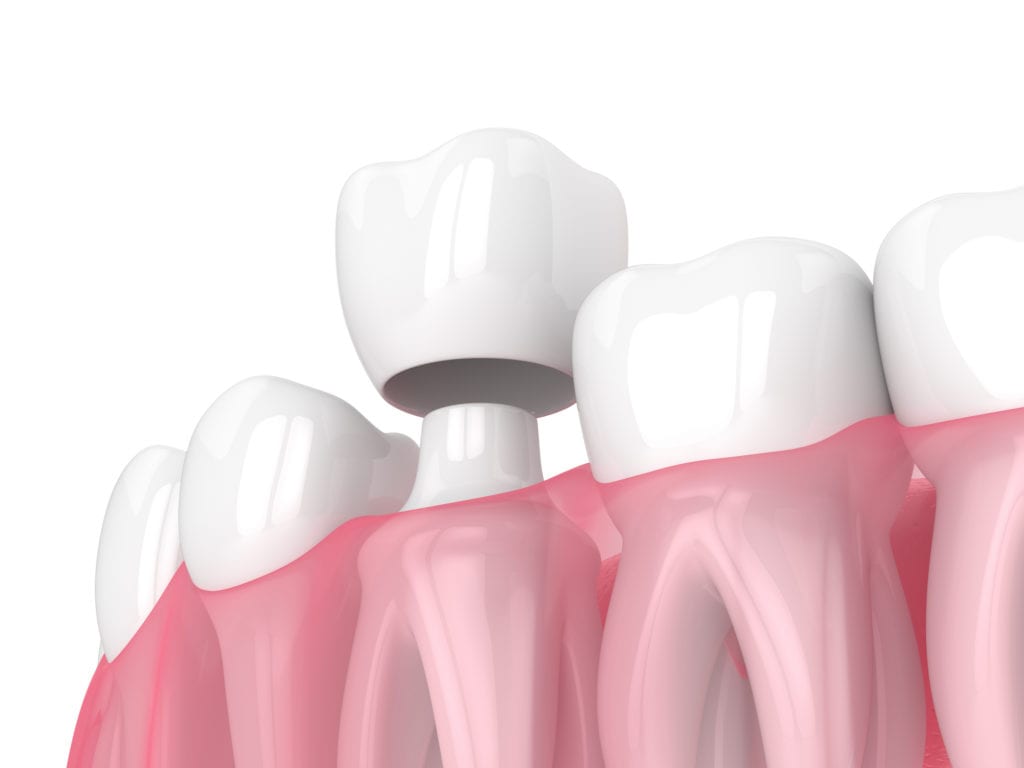Do you have fractured, worn, or weakened teeth? Is your bite uneven because of tooth damage? Tooth crowns are a dental restoration that our office provides to patients in Bladenboro, NC. They are crafted from durable porcelain ceramic that fully covers and caps off damaged teeth.
Patients with tooth damage or discoloration benefit from crowns because they look just like natural teeth. Crowns may be used to cap implants, which add structure and support to the restoration. Dr. Shannon French can also color-match dental crowns to blend in with your smile.

What Can Dental Crowns Do?
Tooth crowns are often used to:
- Cap off dental implants
- Hold dental bridges in place
- Restore broken or worn teeth
- Support teeth after a root canal
- Protect weak teeth
- Cover discolored teeth
Please contact our office if you have discolored, damaged, or weakened teeth. We will take your dental and medical history, budget, goals, and current concerns into account before planning treatment. After learning about your concerns and oral history our experienced dental team will determine the best treatment plan to meet your needs.
Dental Crown Treatment at Bladenboro Family Dentistry
It typically takes two visits for a patient to receive a dental crown. For the most comfortable experience possible, we always numb the treated area with a local anesthetic. Along with anesthetic, we can also use dental sedation so patients feel relaxed during their treatment. Sedation dentistry allows for a pain-free procedure.
To begin, we will remove a small amount of the tooth structure to make sure that the crown adheres to the tooth. We will take a digital impression of your teeth which is sent to a dental lab where the crown or crowns are fabricated. Crowns are created to match the color, shape, and size of your natural teeth so that they appear completed natural to the naked eye.
Our office will also fit you with a temporary restoration until the permanent one is ready for placement. Once the crowns are complete, we will ensure that they match the color of your natural teeth and feel comfortable.
Patients may experience pain or sensitivity following their treatment. We will prescribe pain medication and recommend that patients use ice packs to combat swelling. We recommend that patients stick to a soft diet and avoid particularly hot or cold drinks for the first two weeks after their crown is placed as these may cause sensitivity. After you have adjusted to your crown you may resume your regular diet.
If you have a broken or old tooth crown, please contact our dental office for an immediate appointment. We can restore or replace the dental crown for you. Sometimes not replacing a single crown soon enough can impact the health of the surrounding teeth and causes serious discomfort.
What are Inlays and Onlays?
Inlays and Onlays are similar to tooth crowns and dental fillings but cover a different area of the tooth. They can cover worn teeth or replace dental fillings. Onlays are sometimes called partial crowns because they cover the cusps, or sides, of the tooth. Alternatively, inlays fill the area between the tooth cusps. Both inlays and onlays are made of porcelain ceramic, so they easily blend in with the rest of the smile. They provide durability to the surface of the tooth but do not cover the tooth fully like crowns.
Dental Crowns FAQs
Do you have questions about your current dental crown, or want to know if crowns would benefit your smile. Continue reading to find answers to frequently asked questions in our office.
How long do dental crowns take to settle?
Although your new crown may feel bulkier immediately after implantation, in about two weeks you will have adjusted to your new crown. It typically takes about two weeks to settle into your new crown.
What to expect after getting a dental crown?
Dental crown procedures usually require a few days of downtime for healing due to the inflammation and irritation caused by the operation. You may experience some sensitivity, discomfort, or pain at first, although it should fade after the first few days.
How do you clean under a crown?
Use a soft toothbrush to thoroughly clean the teeth. You can also add a fluoride rinse and fluoride toothpaste or gel to your cleaning regimen. Gently floss the veneers and bridges, being careful to avoid breakage. Finish with a mouthwash rinse to remove the bacteria that lead to tooth decay.
Which crown material is best?
Bridges and dentures use porcelain material, which can be discolored by consuming dark or acidic foods or beverages. It is important to refrain from deeply colored food and drink and have your dentist clean your dentures and bridges regularly to avoid staining.
Can I brush my teeth if my crown fell off?
If the crown is missing, the tooth will need to be protected in some other way. When a crown is lost, sensitive dentin and pulp are exposed. You can remove some of the plaque and bacteria by gently brushing the tooth with toothpaste before seeing your dentist.
How painful is a dental crown procedure?
From start to finish, getting a crown is a painless procedure. Before the procedure begins we will numb your mouth with an anesthetic. This will ensure that you are pain-free throughout the procedure. After the procedure is over and the anesthetic wears off you may experience minor discomfort, but it should go away within a day or two.
Does a crown require a root canal?
A root canal is not necessarily necessary in order to get a crown, and vice versa. However, on some occasions, you might require both treatments. This varies case by case and is dependent on the individual.
Request a Dental Appointment Today
Restore the function and health of your smile with one or more dental crowns. Schedule a dental consultation with Dr. French on our website or call us at 910-469-4592. Our dental office sees patients from Bladenboro, Clarkton, and Fayetteville, North Carolina. Please let our team know if you have any more questions about dental crowns.
